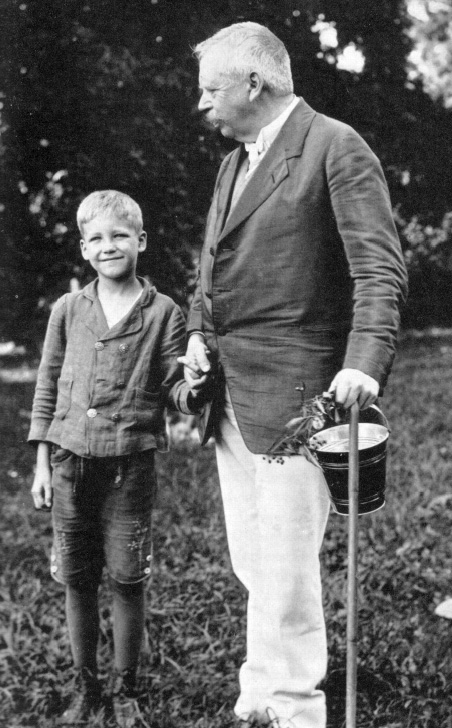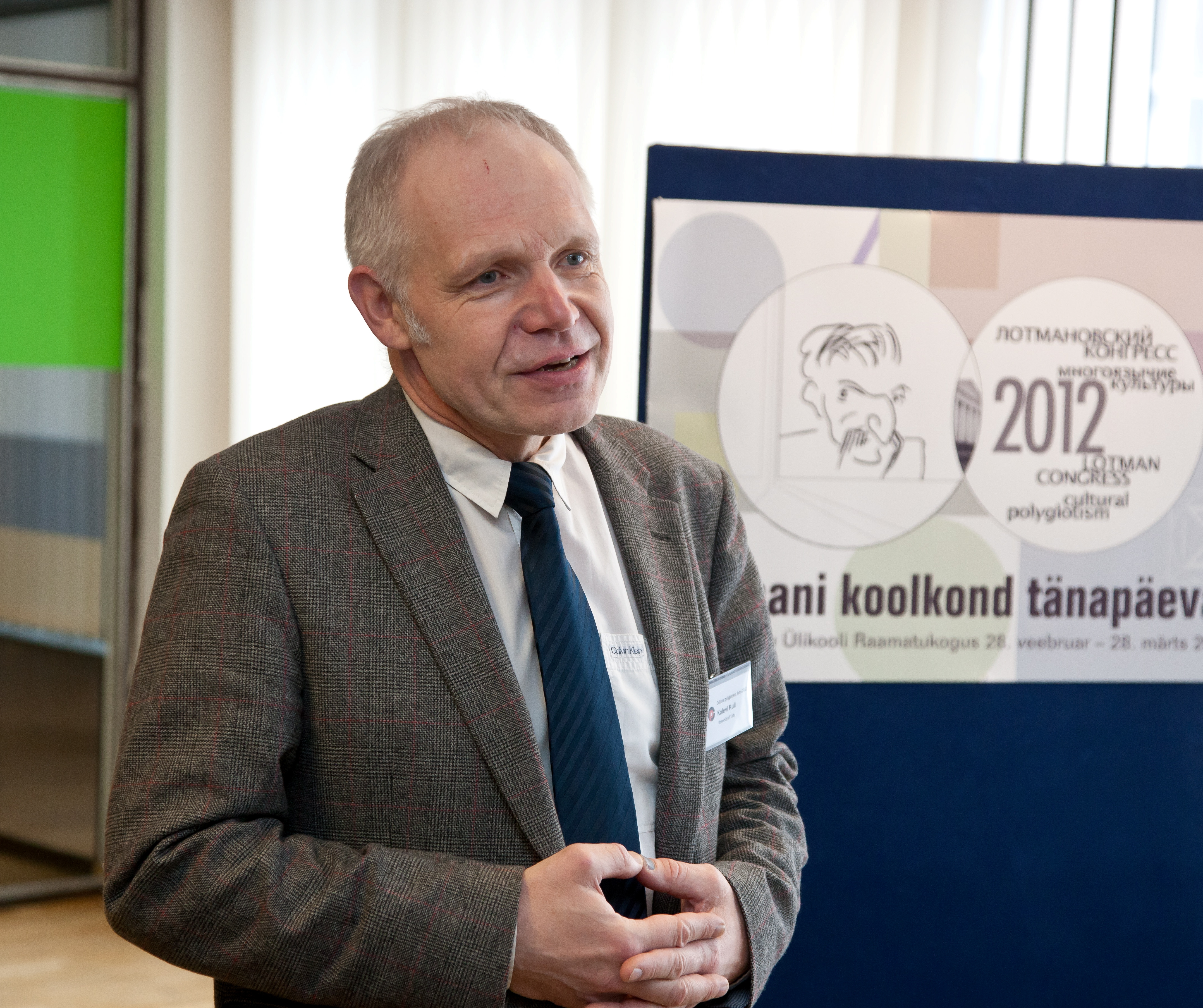|
Thure Von Uexküll
Karl Kuno Thure Freiherr von Uexküll (March 15, 1908, Heidelberg – September 29, 2004, Freiburg) was a German scholar of psychosomatic medicine and biosemiotics. He developed the approach of his father, Jakob von Uexküll, in the study of living systems and applied it in medicine. His mother was Gudrun Baroness von Uexküll (Gräfin von Schwerin). Career ;1955–1965: Director of the Medical Outpatient Department at the University of Giessen ;1966–1977: Director of the Department of Internal Medicine and Psychosomatics at the University of Ulm Awards Honorary Doctor of the University of Tartu (1994) Works *''Der Sinn des Lebens'' (with Jakob von Uexküll). Godesberg: H.Küpper (1947). *''Der Mensch und die Natur. Grundzüge einer Naturphilosophie.'' Bern: Francke (1953). *''Grundfragen der psychosomatischen Medizin.'' Hamburg: Rowohlt (1963). *''Signs, Symbols and Systems.'' In: T. Sebeok, R. Posner (Hg): A semiotic Landscape. Den Haag, Paris, New York (1974), 487–492. * ... [...More Info...] [...Related Items...] OR: [Wikipedia] [Google] [Baidu] |
Kalevi Kull
Kalevi Kull (born 12 August 1952, Tartu) is a biosemiotics professor at the University of Tartu, Estonia. He graduated from the University of Tartu in 1975. His earlier work dealt with ethology and field ecology. He has studied the mechanisms of species coexistence in species-rich communities and developed mathematical modelling in ecophysiology. Since 1975, he has been the main organiser of annual meetings of theoretical biology in Estonia. In 1992, he became a Professor of Ecophysiology in the University of Tartu. In 1997, he joined the Department of Semiotics, and became a Professor in Biosemiotics. From 2006 to 2018, he was the Head of the Department of Semiotics in the University of Tartu, Estonia. His field of interests include biosemiotics, ecosemiotics, general semiotics, theoretical biology, theory of evolution, history and philosophy of semiotics and life science. He was the president of the Estonian Naturalists' Society in 1991–1994. He is a founder of the Jakob von ... [...More Info...] [...Related Items...] OR: [Wikipedia] [Google] [Baidu] |
Academic Staff Of The University Of Giessen
An academy (Attic Greek: Ἀκαδήμεια; Koine Greek Ἀκαδημία) is an institution of tertiary education. The name traces back to Plato's school of philosophy, founded approximately 386 BC at Akademia, a sanctuary of Athena, the goddess of wisdom and Skills, skill, north of Ancient Athens, Athens, Greece. The Royal Spanish Academy defines academy as scientific, literary or artistic society established with public authority and as a teaching establishment, public or private, of a professional, artistic, technical or simply practical nature. Etymology The word comes from the ''Academy'' in ancient Greece, which derives from the Athenian hero, ''Akademos''. Outside the city walls of Athens, the Gymnasium (ancient Greece), gymnasium was made famous by Plato as a center of learning. The sacred space, dedicated to the goddess of wisdom, Athena, had formerly been an olive Grove (nature), grove, hence the expression "the groves of Academe". In these gardens, the philos ... [...More Info...] [...Related Items...] OR: [Wikipedia] [Google] [Baidu] |
German Semioticians
German(s) may refer to: * Germany, the country of the Germans and German things **Germania (Roman era) * Germans, citizens of Germany, people of German ancestry, or native speakers of the German language ** For citizenship in Germany, see also German nationality law **Germanic peoples (Roman era) * German diaspora * German language * German cuisine, traditional foods of Germany People * German (given name) * German (surname) * Germán, a Spanish name Places * German (parish), Isle of Man * German, Albania, or Gërmej * German, Bulgaria * German, Iran * German, North Macedonia * German, New York, U.S. * Agios Germanos, Greece Other uses * German (mythology), a South Slavic mythological being * Germans (band), a Canadian rock band * "German" (song), a 2019 song by No Money Enterprise * ''The German'', a 2008 short film * "The Germans", an episode of ''Fawlty Towers'' * ''The German'', a nickname for Congolese rebel André Kisase Ngandu See also * Germanic (disambig ... [...More Info...] [...Related Items...] OR: [Wikipedia] [Google] [Baidu] |
People From The Grand Duchy Of Baden
The term "the people" refers to the public or common mass of people of a polity. As such it is a concept of human rights law, international law as well as constitutional law, particularly used for claims of popular sovereignty. In contrast, a people is any plurality of persons considered as a whole. Used in politics and law, the term "a people" refers to the collective or community of an ethnic group or nation. Concepts Legal Chapter One, Article One of the Charter of the United Nations states that "peoples" have the right to self-determination. Though the mere status as peoples and the right to self-determination, as for example in the case of Indigenous peoples (''peoples'', as in all groups of indigenous people, not merely all indigenous persons as in ''indigenous people''), does not automatically provide for independent sovereignty and therefore secession. Indeed, judge Ivor Jennings identified the inherent problems in the right of "peoples" to self-determination, as i ... [...More Info...] [...Related Items...] OR: [Wikipedia] [Google] [Baidu] |
Physicians From Heidelberg
A physician, medical practitioner (British English), medical doctor, or simply doctor is a health professional who practices medicine, which is concerned with promoting, maintaining or restoring health through the study, diagnosis, prognosis and treatment of disease, injury, and other physical and mental impairments. Physicians may focus their practice on certain disease categories, types of patients, and methods of treatment—known as specialities—or they may assume responsibility for the provision of continuing and comprehensive medical care to individuals, families, and communities—known as general practice. Medical practice properly requires both a detailed knowledge of the academic disciplines, such as anatomy and physiology, underlying diseases, and their treatment, which is the science of medicine, and a decent competence in its applied practice, which is the art or craft of the profession. Both the role of the physician and the meaning of the word itself vary a ... [...More Info...] [...Related Items...] OR: [Wikipedia] [Google] [Baidu] |
2004 Deaths
This is a list of lists of deaths of notable people, organized by year. New deaths articles are added to their respective month (e.g., Deaths in ) and then linked below. 2025 2024 2023 2022 2021 2020 2019 2018 2017 2016 2015 2014 2013 2012 2011 2010 2009 2008 2007 2006 2005 2004 2003 2002 2001 2000 1999 1998 1997 1996 1995 1994 1993 1992 1991 1990 1989 1988 1987 1986 Earlier years ''Deaths in years earlier than this can usually be found in the main articles of the years.'' See also * Lists of deaths by day * Deaths by year (category) {{DEFAULTSORT:deaths by year ... [...More Info...] [...Related Items...] OR: [Wikipedia] [Google] [Baidu] |
1908 Births
This is the longest year in either the Julian or Gregorian calendars, having a duration of 31622401.38 seconds of Terrestrial Time (or ephemeris time), measured according to the definition of mean solar time. Events January * January 1 – The British ''Nimrod'' Expedition led by Ernest Shackleton sets sail from New Zealand on the ''Nimrod'' for Antarctica. * January 3 – A total solar eclipse is visible in the Pacific Ocean and is the 46th solar eclipse of Solar Saros 130. * January 13 – A fire breaks out at the Rhoads Opera House in Boyertown, Pennsylvania, killing 171 people. * January 15 – Alpha Kappa Alpha, the first race inclusive sorority is founded on the campus of Howard University in Washington, D.C. * January 24 – Robert Baden-Powell's '' Scouting for Boys'' begins publication in London. The book eventually sells over 100 million copies, and effectively begins the worldwide Boy Scout movement. February * February 1 – Lisbon Regicide: Ki ... [...More Info...] [...Related Items...] OR: [Wikipedia] [Google] [Baidu] |
Sign Systems Studies
''Sign Systems Studies'' is a peer-reviewed academic journal on semiotics edited at the Department of Semiotics of the University of Tartu and published by the University of Tartu Press. It is the oldest periodical in the field. It was initially published in Russian and since 1998 in English with Russian and Estonian language abstracts. The journal was established by Juri Lotman as ''Trudy po Znakovym Sistemam'' in 1964. Since 1998 it has been edited by Kalevi Kull, Mihhail Lotman, and Peeter Torop. Since 2022, Ott Puumeister leads the editorial team. The journal is available online from the Philosophy Documentation Center, indexed by WoS and Scopus, and starting 2012 also on an open access Open access (OA) is a set of principles and a range of practices through which nominally copyrightable publications are delivered to readers free of access charges or other barriers. With open access strictly defined (according to the 2001 de ... platform. The vol. 50(4) publishe ... [...More Info...] [...Related Items...] OR: [Wikipedia] [Google] [Baidu] |
Jesper Hoffmeyer
Jesper Hoffmeyer (21 February 1942 – 25 September 2019) was a professor at the University of Copenhagen Institute of Biology, and a leading figure in the emerging field of biosemiotics. He was the president of the International Society for Biosemiotic Studies, International Society for Biosemiotic Studies (ISBS) from 2005 to 2015, co-editor of the journal Biosemiotics (journal), ''Biosemiotics'' and thSpringer Book series in Biosemiotics He authored the books ''Biosemiotics: An Examination into the Signs of Life and the Life of Signs'' and ''Signs of Meaning in the Universe'' and edited ''A Legacy for Living Systems: Gregory Bateson as Precursor to Biosemiotics''. Biography Jesper Hoffmeyer was born in Slangerup, Denmark in 1942. He received his Master's degree in Europe#Denmark, Cand. Scient. in biochemistry from the University of Copenhagen in 1967, and from 1967-1968 he was Science Fellow at the Institut de Biochemie Génerale et Comparée of the Collège de France, Paris. He ... [...More Info...] [...Related Items...] OR: [Wikipedia] [Google] [Baidu] |
Martin Krampen
Martin Krampen (March 9, 1928, in Siegen – June 18, 2015, in Ulm) was a leading German semiotician, semiotics Professor in Göttingen. Biography The son of a Protestant pastor, Krampen was born on March 9, 1928, in Siegen and was raised in Wuppertal. He took courses in psychology, philosophy, and theology the University of University of Tübingen and the University of Heidelberg, and studied design with a focus on painting at Accademia delle Belle Arti di Firenze. In 1953 Krampen began studying graphic design and visual communication at the Ulm School of Design. After graduating from the school with a diploma in, he went on to obtain his PhD in Visual Communications from Michigan State University in 1962. While there his studies were focused design and psychology. Krampen worked in the field of visual semiotics and environmental perception, as well as a professional artist. Over the course of his career Krampen held position at universities across North America and Europe ... [...More Info...] [...Related Items...] OR: [Wikipedia] [Google] [Baidu] |
Heidelberg
Heidelberg (; ; ) is the List of cities in Baden-Württemberg by population, fifth-largest city in the States of Germany, German state of Baden-Württemberg, and with a population of about 163,000, of which roughly a quarter consists of students, it is List of cities in Germany by population, Germany's 51st-largest city. Located about south of Frankfurt, Heidelberg is part of the densely populated Rhine-Neckar, Rhine-Neckar Metropolitan Region which has its centre in Mannheim. Heidelberg is located on the Neckar River, at the point where it leaves its narrow valley between the Oden Forest and the Kleiner Odenwald, Little Oden Forest, and enters the wide Upper Rhine Plain. The old town lies in the valley, the end of which is flanked by the Königstuhl (Odenwald), Königstuhl in the south and the Heiligenberg (Heidelberg), Heiligenberg in the north. The majority of the population lives in the districts west of the mountains in the Upper Rhine Plain, into which the city has expan ... [...More Info...] [...Related Items...] OR: [Wikipedia] [Google] [Baidu] |



